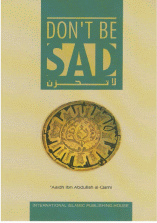Don't be Sad

And come to the prayer
(And seek help in patience and the prayer) (Quran 2: 45)
Whenever the Prophet (bpuh) was in a difficult situation, he would hasten to prayer. He would say to Bilal (may Allah be pleased with him) (whose responsibility it was to say the call to prayer),
"O' Bilal, Give us comfort with it."
When you feel stressed, in difficulty, or when you find yourself to be the victim of deception, hurry to the Mosque and pray.
Especially on important occasions, the Prophet (bpuh) would find peace in prayer, such as in the battle of Badr and Al-Ahzaab. Ibn Hajar, who wrote the most important commentary on Saheeh al- Bukhari, was once trapped in a castle that was surrounded by robbers. And when he stood up for prayer, Allah saved him.
Ibn Asaakir and Ibn al-Qayyim both related the story of a thief who accosted a righteous man, who was on his way to Sham (i.e. the present-day area of Syria and surrounding areas). The thief intended to kill him, but before he came close, the man asked for a respite of a few minutes, so that he could say a prayer. He stood, began his prayer, and remembered Allah's saying:
(ls not He [better than your gods] Who responds to the distressed one, when he calls Him.) (Qur'an 27: 62)
He repeated this verse three times. An angel descended from the sky with a spear and killed the transgressor. The angel said, "I am the angel of the One Who answers the distressed ones when they supplicate."
(And enjoin the prayer on your family and be patient in offering them [i.e. the prayers].) (Qur'an 20: 132)
(Verily, the prayer prevents from Al-Fahiisha [ i. e. great sins of every kind, unlawful sexual intercourse, etc.] and Al-Munkar [i.e. disbelief polytheism, and every kind of evil wicked deed, etc. ].) (Qur'an 29: 45)
(Verily, the prayer is enjoined on the believers affixed hours)
(Qur'an 4: 103)
Sending prayers upon the Prophet (bpuh) also helps to remove hardship:
(O' you who believe! Send your Salaat [Graces, Honor; Blessings, and Mercy] on him [Muhammad] and [you should] greet [salute] him with the Islamic way of greeting [salutation i.e. As-Salaam 'Alaykum].) (Quran 33: 56)
Ubaee ibn Ka'ab (may Allah be pleased with him) asked the Messenger of Allah (bpuh),
"How much of my prayer should I dedicate to sending Salaat upon you?" He said, "As much as you please."
Ubaee said, "one-fourth?" He said, "As much as you please, and if you increase, it is better. " He asked, "Two-thirds?" The Prophet answered, "As much as you please, and if you increase, it is better." He then said, 'l will make it all for you." The Prophet answered, "Then you will be forgiven, and your worries will be taken care of. "
The last line of the previous hadith proves that sending prayers ` and greetings on the Prophet (bpuh) removes worries.
"O' Allah, send prayers (i.e. praise and exalt him in the highest of gatherings, that of the closest angels to Allah) upon Muhammad and the followers of Muhammad, just as you sent prayers upon Ibraheem and upon the followers of Ibraheem. Verily, you are full of praise and majesty. O' Allah, send blessings upon Muhammad and upon the family of Muhammad, just as you sent blessings upon lbraheem and upon the family of Ibraheem. Verily, you are full of praise and majesty."
